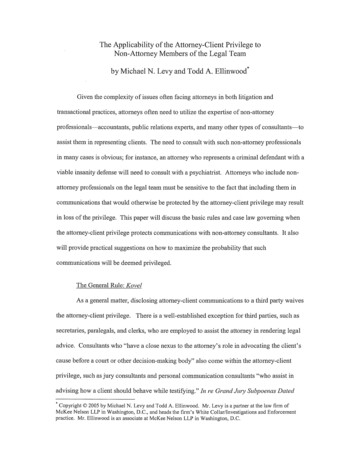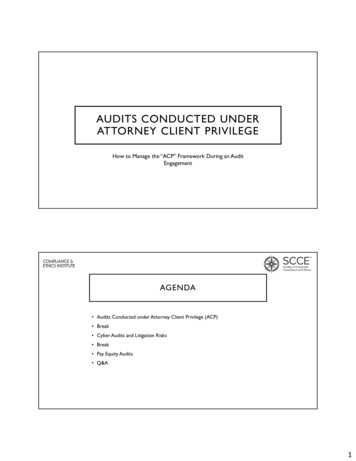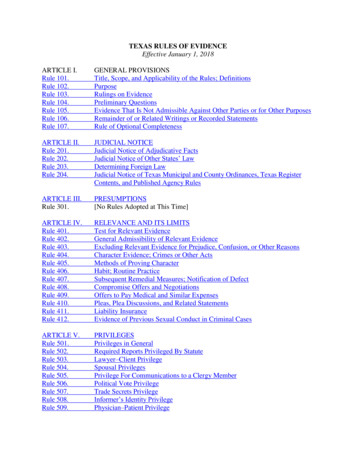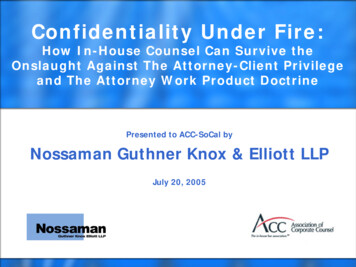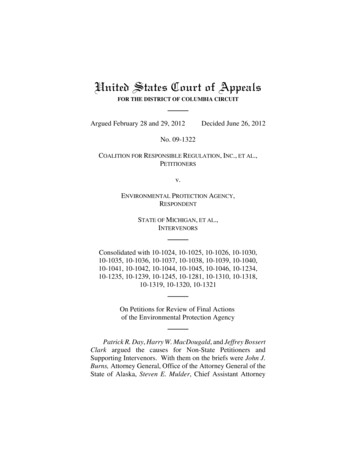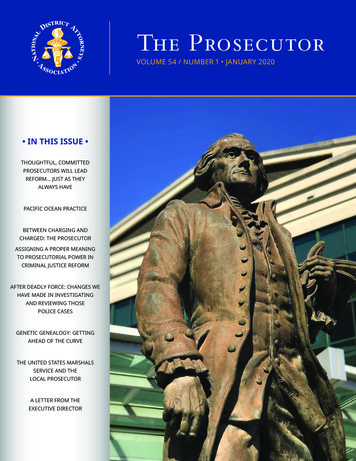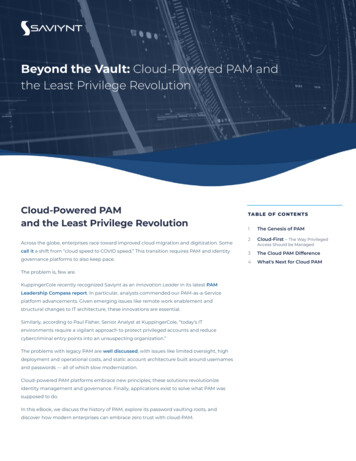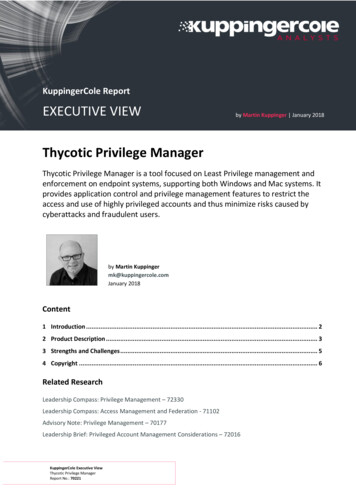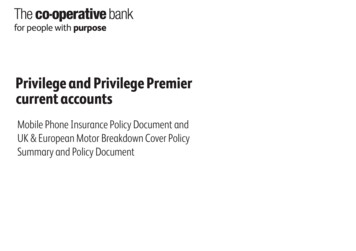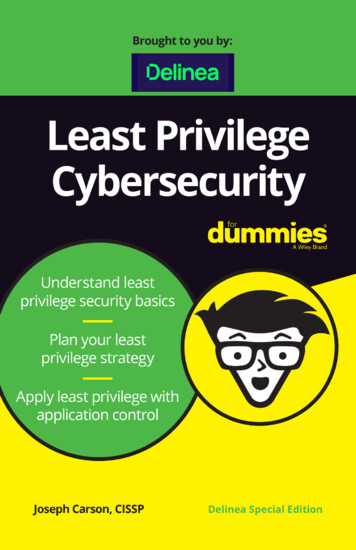
Transcription
Presenting a live 90-minute webinar with interactive Q&AWitness Preparation: Attorney-Client Privilegeand Work Product ChallengesReconciling the Demands of FRCP 26(b) and FRE 612(2)When Preparing Witnesses for Deposition and TrialTUESDAY, JULY 24, 20121pm Eastern 12pm Central 11am Mountain 10am PacificToday’s faculty features:Robert L. Wise, Partner, Bowman and Brooke, Richmond, Va.Steven C. Bennett, Partner, Jones Day, New YorkThe audio portion of the conference may be accessed via the telephone or by using your computer'sspeakers. Please refer to the instructions emailed to registrants for additional information. If youhave any questions, please contact Customer Service at 1-800-926-7926 ext. 10.
Sound QualityIf you are listening via your computer speakers, please note that the quality ofyour sound will vary depending on the speed and quality of your internetconnection.If the sound quality is not satisfactory and you are listening via your computerspeakers, you may listen via the phone: dial 1-866-869-6667 and enter yourPIN -when prompted. Otherwise, please send us a chat or e-mailsound@straffordpub.com immediately so we can address the problem.If you dialed in and have any difficulties during the call, press *0 for assistance.Viewing QualityTo maximize your screen, press the F11 key on your keyboard. To exit full screen,press the F11 key again.
FOR LIVE EVENT ONLYFor CLE purposes, please let us know how many people are listening at yourlocation by completing each of the following steps: In the chat box, type (1) your company name and (2) the number ofattendees at your location Click the SEND button beside the box
If you have not printed the conference materials for this program, pleasecomplete the following steps: Click on the sign next to “Conference Materials” in the middle of the lefthand column on your screen. Click on the tab labeled “Handouts” that appears, and there you will see aPDF of the slides for today's program. Double click on the PDF and a separate page will open. Print the slides by clicking on the printer icon.
Witness Preparation: Attorney-ClientPrivilege And Work Product Challenges:FRCP 26 And Its ImplicationsJuly 2012Strafford PublicationsSteven C. BennettJones Day –New Yorkscbennett@jonesday.comNYI-4385553v15
Presenter Background Partner, Jones Day (New York office) Commercial Litigation (20 years) Member, New York State Bar Association CorporateCounsel Committee Adjunct Professor, New York Law School, HofstraNYI-4385553v16
Disclaimers The views expressed are solely those of the presenter,and should not be attributed to the presenter’s firm orits clients. This presentation does not constitute legal advice; nordoes it constitute solicitation of an attorney/clientrelationship.NYI-4385553v17
Agenda Privilege and work product protection underFRCP 26 Protecting core work product from disclosure underFRE 612 Balancing rules Best practices ReferencesNYI-4385553v18
OverviewNYI-4385553v19
General Elements To EstablishAttorney-Client Privilege Legal advice sought From professional legal advisor in that capacity Communications made for that purpose In confidence By the client At the client’s instance permanently protected Unless the privilege is waived United States v. United Shoe Mach. Corp., 89 F. Supp. 357 (D.Mass. 1950)NYI-4385553v110
Expert May Be Covered ByAttorney-Client Privilege Employee of client “Translator” FRCP 26(b)(4)(B): exclusion of discovery, except:– Exceptional circumstances– Impracticable to obtain facts by other meansNYI-4385553v111
Work Product Doctrine Protects information created in anticipation oflitigation– Generally, attorney’s mental processes– Specifically, memoranda, analyses, etc. thatattorney creates Can apply to consultants engaged by counsel Unlike attorney-client privilege, both the attorney andthe client can claim it Fed. R. Civ. P. 26(b)(3)NYI-4385553v112
Expert May Be CoveredBy Work Product FRCP 26(b)(3)(a): materials created by or for aparty, including attorney or consultant Anticipation of litigation (aid in preparation) Not merely business adviceNYI-4385553v113
Consulting ExpertsNYI-4385553v114
Range Of Functions Document organization/analysis Claim/defense preparation Assist counsel with discovery/strategy Assist counsel with negotiation, mediation, litigationNYI-4385553v115
Non-Traditional Expert Media consultant Jury consultant Graphics artistNYI-4385553v116
Potential Problem Areas Unretained expert– Conflicts– Unhelpful opinion No privilege for identity of unretained experts Consulting expert for one purpose; testifying expertfor other purpose Treating physician (fact/opinion mixture)– Cannot create privilege after-the-factNYI-4385553v117
Thompson v. Haskell Co.,1994 WL 597252 (M.D. Fla. 1994) Claim for sexual harassment Alleged depression Plaintiff sees doctor; doctor creates report Defense wants report to show mental state at time offiring Held: report must be produced– No other source of comparable informationNYI-4385553v118
Chiquita Int’l Ltd. v. M/V Bolero Reefer,1994 WL 263603 (S.D.N.Y. 1994) Failure in shipment of bananas Expert surveys condition of cargo Held: Expert has performed more than fact gathering– Photos of cargo not discoverable, as defendanthad own photosNYI-4385553v119
Testifying ExpertsNYI-4385553v120
Attorney Communications With ExpertMay Be Part Of What Expert “Considered” Explanation of the case/what attorney wants Documents selected for review Comments on expert report Terms of engagement/limits/feesNYI-4385553v121
Documents Provided ToExpert Lose Privilege Advisory Committee Notes: Documents providedare not privileged, even if expert does not rely onthem Documents provided are subject to discovery. In reOmeprazole Patent Lit., 2005 WL 818821 (S.D.N.Y.2005)NYI-4385553v122
Documents Must RelateTo Expert’s Work Define by subject matter of report. See AmericanS.S. Owners v. Alcoa S.S. Co., 2006 WL 212376(S.D.N.Y. 2006) Must bear some “probative relationship” to expert’sopinion. See Oneida, Ltd. V. United States, 43 Fed.Cl. 611 (Fed. Cl. 1999)NYI-4385553v123
Potential Problem Areas Expert begins as non-testifying consultant; then isasked to testify Expert operates in firm that provides both testifyingand consulting service (for the same client) Testifying expert relies on information from nontestifying expertNYI-4385553v124
Attorney Client Expert If expert is testifying, communication may not beprivileged Beware testifying expert involvement in strategyNYI-4385553v125
Shooker v. Superior Court,4 Cal. Rptr. 3d 334 (Cal. App. 2003) Plaintiff designates himself as an expert in the case Trial court orders discovery regarding conversationswith counsel Plaintiff withdraws designation Held: designation alone does not waive privilegeNYI-4385553v126
Spoliation By Expert FRCP 26(a)(2)(B) requires disclosure of information“considered,” not only what ultimately forms basisfor opinion “Adverse inference” or other sanction where expertfails to preserve/produce information considered.See Trigon Ins. Co. v. United States, 204 F.R.D. 277(E.D. Va. 2001) Expert need not retain every scrap of paper. FidelityNat’l Title Ins. Co. v. Intercounty Nat’l Title Ins. Co.,412 F.3d 745 (7th Cir. 2005)NYI-4385553v127
FRCP 26AmendmentsNYI-4385553v128
Amended Rule 26 (2010) Add/clarify disclosure requirements for experts forwhom no report is required “Limit” disclosure to “facts and data” Some work product protection for drafts andattorney-expert communicationsNYI-4385553v129
Purposes Rule 26(a) amendments were proposed because:– Many lawyers agree to not exchange drafts andcommunications in particular cases– Access to drafts and communications often increase theexpense of discovery, with minimal return (if any)– The need to avoid reducing communications (and drafts) towriting complicates the attorney-expert working relationshipand can increase cost– The need for consulting experts increased with the introductionof the current rule in 1993, in order to insulate testifyingexperts, which creates inequities for clients that cannot affordtwo experts– Attorneys are less willing to use experts who do not have priortestifying experience, for fear their attempts to train such expertto testify will be misconstruedNYI-4385553v130
Text Changes 26(a)(2)(B)(ii)– Old Rule: “data or other information consideredby the witness in forming [all opinions]”– Revised Rule: “facts or data considered by thewitness in forming [all opinions]”– Comment to revised rule makes clear changeintended to avoid disclosure of drafts and at leastsome attorney-expert communicationsNYI-4385553v131
Text Changes 26(b)(4)(B)– Draft reports and disclosures are protected aswork product– Applies to any testifying expert 26(b)(4)(C)– Communications between expert and attorney areprotected as work product– Applies only to experts required to provide areport– Three exceptions: compensation, factsconsidered, and assumptionsNYI-4385553v132
Text Changes 26(a)(2)(C)– Provides for disclosure of certain information forexperts not subject to report requirements Subject matter of evidence under 702, 703, or 705 Summary of facts and opinions– Comment suggests that disclosure need notinclude facts unrelated to expert opinionsNYI-4385553v133
Practical Implications New rules only apply to federal cases. New rules will probably be applied retroactively. Consider stipulating with opposing counsel. Only communications with Rule 26(a)(2)(B) expertswill receive work product protection;NYI-4385553v134
Practical Implications Attorney communications with testifying experts whodo not prepare a report are discoverable. Work product protection is not absolute. Rule 612(b) of the Rules of Evidence still applies.NYI-4385553v135
Practical Implications Segregate your non-confidential communicationswith testifying experts. Failure to properly disclose a non Rule 26(a)(2)(B)testifying expert may result in exclusion of theexpert’s testimony. The new federal rules do not change attorneys’ethical duties.NYI-4385553v136
Cases Interpreting New RulesDongguk Univ. v. Yale Univ., 2011 WL 1935865 (D. Conn.May 19, 2011) (hand-written notes still discoverable).Sara Lee Corp. v. Kraft Foods, Inc., F.R.D. , 2011 WL1311900 (N.D. III. April 1, 2011) (denying motion to compel inpart by applying new “facts or data” language and revised rule).Daugherty v. Amer. Express Co., 2011 WL 1106744 (W.D. Ky.March 23, 2011) (applying amendments to case filed in 2008 as“just and practical”).CIVIX-DDI, LLC v. Metro. Regional Inform. Systems, Inc.,F.R.D. , 2011 WL 922611 (E.D. Va. March 8, 2011) (amendedrules apply to case filed on August 30, 2010).Graco v. PMC Global, Inc., 2011 WL 666056 (D. N.J. Feb. 14,2011) (analyzing revised rule).NYI-4385553v137
Cases Interpreting New RulesNat’l Western Life Ins. Co. v. Western Nat’l Life Ins. Co., 2011WL 840976 (W.D. Tex. March 3, 2011) (limiting discovery undernew rule).Crabbs v. Wal-Mart Stores, Inc., 2011 WL 499141 (S.D. IowaFeb. 4, 2011 (applying 26(A)(2)(C) to treating physicians).Estate of Allison v. Vince Scoggins, P.A., 2011 WL 650383 (W.D.N.C. Feb. 10, 2011) (applying revised rule and requiring aprivilege log).NYI-4385553v138
Best PracticesNYI-4385553v1NYI-4385553v13939
Communication Discuss role of expert Discuss process:– Information exchange– Report drafting– Discovery Establish policy re: notes/communication withcounsel Beware “experienced” experts who don’t followdirectionsNYI-4385553v140
Maintain Protection OfConsulting Expert Route directions through counsel Mark documents “privileged” Keep track for privilege review/logNYI-4385553v141
Maintain Independence ofTestifying Experts Expert should follow standard methods for inquiry Attorney may describe available information, butexpert chooses what to review Expert must be willing to defend opinionNYI-4385553v142
ReferencesBennett, Expert Discovery: What Is Discoverable?,N.L.J., Dec. 11, 2006Bennett, Explore Potential Of Expert Witness Work,18:5 CPA Man. Partner Rep. 5NYI-4385553v143
Questions?Scbennett@jonesday.comNYI-4385553v144
Witness Preparation: Attorney-ClientPrivilege and Work Product Challenges:The Role of FRE 612 inProtecting Work ProductRobert L. WiseBowman and Brooke LLProb.wise@bowmanandbrooke.com45
Firm ProfileBowman and Brooke LLP is a nationally recognized trial firm with one of thelargest product liability practices in the country. The firm’s 185 attorneysdefend a variety of corporate clients, including many Fortune 500 andinternationally-based companies, in widely publicized catastrophic injury andwrongful death matters, and in other complex litigation throughout all 50states. Bowman and Brooke’s lawyers regularly represent their clients and trycases in courthouses across the United States.Complementing our national product liability defense practice, Bowman andBrooke provides well-established litigation practice groups in commercial,intellectual property, environmental, construction, consumer warranty andhealthcare litigation. The firm has offices in Minneapolis, Phoenix, Detroit,San Jose, Los Angeles, Richmond, Columbia, Dallas and Austin.46
Presenter Background Co-Managing Partner (Richmond office). Founding member of firm-wide Appellate and TrialSupport Practice Group. Focuses on appeals and advance motions support,class-action defense, product liability litigation, andintellectual property litigation. Member of DRI’s Appellate Advocacy and DiversityCommittees and director of the Virginia Associationof Defense Attorneys.47
IssueThe selection and compilation ofdocuments as a means to prepare thewitness—is it work product?48
Opinion Work-Product The selection and compilation by counsel of documentsfrom a larger set of documents is opinion work-product.Sporck v. Peil, 759 F.2d 312, 316 (3d Cir.), cert. denied,474 U.S. 903 (1985) (selection and compilation are“highly-protected . . . opinion work-product”); see also Inre Allen, 106 F.3d 582, 608 (4th Cir. 1997); Shelton v.Am. Motors Corp., 805 F.2d 1323, 1329 (8th Cir. 1986);but see In re San Juan duPont Plaza Hotel FireLitigation, 859 F.2d 1007, 1018 (1st Cir. 1988) (findingattorney compilation unprotected). See also 7 James Wm. Moore et al., Moore’s FederalPractice § 26.70[2][b] n.15 (3d. ed. 2008).49
Opinion Work-Product Attorney compilations provide a window into counsel's mentalimpressions about the case and which documents counselthinks are most relevant to a topic. Sporck, 759 F.2d at 316. The Sporck court reasoned:“In selecting and ordering a few documents out ofthousands counsel could not help but reveal importantaspects of his understanding of the case. Indeed, in acase such as this, involving extensive document discovery,the process of selection and distillation is often morecritical than pure legal research. There can be no doubtthat at least in the first instance the binders were entitled toprotection as work product.”Id. (quoting James Julian, Inc. v. Raytheon Corp., 93 F.R.D.138, 144 (D. Del. 1982)).50
Scope of the Protection Thus, Fed. R. Civ. P. 26 is always a first step, butits protection is not absolute. Protected materials, including those within acompilation used to help prepare a witness fordeposition, may be discoverable if they are put toa “testimonial use.” See, e.g., Nutramax Labs.,Inc. v. Twin Labs, Inc., 183 F.R.D. 458, 463 (D.Md. 1998).51
Relevant Portions of Fed. R. Evid. 612(a) Scope. This rule gives an adverse party certain options when awitness uses a writing to refresh memory:(1) while testifying; or(2) before testifying, if the court decides that justice requires the party tohave those options.(b) Adverse Party’s Options; Deleting Unrelated Matter. . . .an adverse party is entitled to have the writing produced at thehearing, to inspect it, to cross-examine the witness about it, and tointroduce in evidence any portion that relates to the witness’stestimony. If the producing party claims that the writing includesunrelated matter, the court must examine the writing in camera,delete any unrelated portion, and order that the rest be deliveredto the adverse party. Any portion deleted over objection must bepreserved for the record.52
Relevant Portions of Fed. R. Evid. 612 Rule 612 was amended in 2011, effective December1, 2011. The Advisory Committee notes to the 2011amendment explain the changes were “intended to bestylistic only,” and there was “no intent to change anyresult in any ruling on evidence admissibility.” Thus, all pre-amendment case law should remainviable.53
Scope of the Use of Rule 612 – Sword Generally, the “before testifying” portion of Rule 612 applies todepositions. Nutramax, 183 F.R.D. at 467 (applying Rule 612 to thecontext of depositions); but see Omaha Pub. Power Dist. v. FosterWheeler Corp., 109 F.R.D. 615, 616-17 (D. Neb. 1986) (commentingthat Rule 612 does not apply to depositions). Testimony from recollection refreshed by a review of a document beforethe deposition can be deemed a “testimonial use” under Rule 612. See,e.g., Nutramax, 183 F.R.D. at 467. Therefore, any privilege or protection that might otherwise apply may bewaived by such testimonial use. Id.; see also In re Methyl Tertiary ButylEther (“MTBE”) Prods. Liab. Litig., No. MDL 1358(SAS), 2012 WL2044432 (S.D.N.Y. June 6, 2012) (noting “a tension is created betweenthe protection afforded by the [work-product] doctrine and Rule 612’sprovision that the ‘adverse party is entitled to have the writing producedat the hearing’”).54
Scope of the Use of Rule 612 – Shield However, Rule 612 does not provide an automatic right toall documents reviewed in preparation for the corporaterepresentative deposition. Instead, while the compilation retains its protected status,there may be an exception to the privilege when certaindocuments are put to a “testimonial use.” Nutramax, 183F.R.D. at 467. But the party seeking production of such individualdocuments must first lay a proper foundation. Id. at 468.55
Rule 612 Foundational Requirements Access will only be given to “those writings whichmay fairly be said in part to have an impact upon thetestimony of the witness.” Id. (internal quotationsomitted); see also United States v. Sheffield, 55 F.2d341, 343 (8th Cir. 1995) (“Rule 612 is not a vehiclefor a plenary search for contradicting or rebuttingevidence that may be in a file but rather is a means toreawaken recollection of the witness to the witness'spast perception about a writing.”). Rule 612 cannot be used “as a pretext for wholesaleexploration of an opposing party’s files.” Nutramax,183 F.R.D. at 468.56
Rule 612 Foundational Requirements Deposing counsel must first show that the witnessused the particular document to refresh his or hermemory on a specific, relevant topic. Second, deposing counsel must show that the witnessactually used the document for the purpose oftestifying. If the requesting party cannot lay this two-stepfoundation, the documents need not be produced.Nutramax, 183 F.R.D. at 468.57
Rule 612 Foundational Requirements If the two-step foundation can be met, there is still anotherelement that must be addressed. Audiotext Commc'nsNetwork, Inc. v. US Telecom, Inc., 164 F.R.D. 250, 252(D. Kan 1996). Rule 612(2) provides that the deposing party must alsoshow, and the court must find, that the “interests ofjustice” support production of the document used torefresh recollection. Nutramax, 183 F.R.D. at 468. This element requires a “balancing test to weigh thepolicies underlying the work product doctrine against theneed for disclosure to promote effective crossexamination and impeachment.” Id.58
Rule 612 Foundational Requirements(“Interests of Justice”)The Nutramax court provided nine illustrative, but notexhaus-tive, factors for a court to consider:(1) status of the witness—for example, (7) the extent to which thefact, expert, or corporate representative; documents contain “pure” attorneywork product;(2) nature of the issue in dispute;(8) whether the documents had(3) when the events took place;been previously disclosed; and(4) when the documents were reviewed;(9) whether there are legitimate(5) the number of documents reviewed; concerns regarding destruction ofthe documents.(6) whether the witness prepared thedocuments reviewed;Id. at 469–70.59
Rule 612 Foundational Requirements(“Interests of Justice”) Applying this analysis on a case-by-case basis,the Nutramax court ultimately found that theinterests of justice favored ordering production ofsome of the individual documents. “[T]here is greater need to know what materialswere reviewed by expert and designee witnessesin preparation for deposition since the substanceof their testimony may be based on sourcesbeyond personal knowledge.” Id. at 469.60
Practical Uses and DefensesThe issue can arise several ways, for example: Sometimes, the deposition notice will contain ablanket request for all documents reviewed inpreparation for the deposition; or The deposing party may, as in Sporck, requestproduction of all preparation materials at theoutset of the deposition, prior to laying anyfoundation or asking any substantive questions.Under the Sporck/Nutramax line of cases, eitherapproach is improper.61
Practical Uses and Defenses In a jurisdiction following Sporck, any pre-depositiondocument request for the compilation of materialsused in preparation should be objected to as askingfor protected work product, possibly with a motionfor protective order as well. However, it is important to distinguish betweendisclosure of the individual compiled preparationmaterials themselves, and disclosure of the contentsof a compilation as a compilation. This strategy was used in Frazier v. Ford MotorCompany, No. 4:05CV04077, 2008 WL 4809130(W.D. Ark. Oct. 31, 2008).62
Practical Uses and Defenses The Frazier court sustained the objection to therequested blanket production of all preparation materials,as it was observed that the production would requireFord to tell plaintiff's lawyers which documents, of thosealready produced, Ford's lawyers deem significant. The court reasoned:“While it is the task of Ford’s lawyers to preparetheir witnesses to testify, it is the task of theplaintiff’s lawyers to select the docu-ments aboutwhich they wish to inquire. The rules do notcontemplate that Ford’s lawyers must assist theplaintiff’s law-yers in selecting documents aboutwhich to inquire during a deposition.”63
Practical Uses and Defenses Likewise, in a Sporck jurisdiction, a comprehensiverequest during the deposition itself without a properfoundation first being laid should likewise be met withan objection. In Sporck, 759 F.2d at 313-14, plaintiff's counselattempted to elicit the identification and production of alldocuments examined or referred to by Charles Sporck inpreparation for his deposition. Defense counsel objected and plaintiff moved to compel. The Third Circuit noted that the request was premature.64
Practical Uses and Defenses The Sporck court noted:“In seeking identification of all documents reviewedby petitioner prior to asking petitioner any questionsconcerning the subject matter of the deposition,respondent’s counsel failed to establish either thatpetitioner relied on any documents in giving histestimony, or that those documents influenced histestimony. Without eliciting that testimony, thereexisted no basis for asking petitioner the source ofthat testimony.”Id. at 318 (internal citation omitted; emphasis added).65
Practical Uses and Defenses Check all local rules and the law of the jurisdiction. Any premature attempt to use Rule 612 as a means todefeat privilege must be met with an objection. The party seeking such materials must then seek to laythe proper foundation for each document requested. Specific questioning, implicating particular documents,is required. Sporck, 759 F.2d at 318; see also StoneContainer Corp. v. Arkwright, No. 93 C 6626, 1995 WL88902 (N.D. Ill. Feb. 28, 1995). If deposing counsel fails to lay the foundation properly,defending counsel should instruct the witness not toanswer. See Fed. R. Civ. P. 30(c)(2).66
Recent Case LawTattletale Portable Alarm Sys, Inc. v. Calfee, Halter & GriswoldLLP, No. 2:10-cv-226, 2012 WL 2062648 (S.D. Ohio June 7,2012): Company president reviewed time line prepared by company’s counsel torefresh his recollection of dates in preparation for deposition. Magistrate judge compelled production of the time line. 276 F.R.D. 573(S.D. Ohio 2011). District judge sustained company’s objection, holding that “[b]ecause thisdocument directly reflects the opinion of plaintiff’s counsel, it is notsubject to disclosure.” Court also rejected notion that use in refresh memory waived privilege.67
Recent Case LawIn re Methyl Tertiary Butyl Ether (“MTBE”) Prods. Liab. Litig.,No. MDL 1358(SAS), 2012 WL 2044432 (S.D.N.Y. June 6,2012): Defense expert reviewed and read from a chart containing summary of alldefense experts’ opinions during his deposition. Court noted the tension between work-product protections and Rule 612when the witness uses the work product to refresh his or her recollection. Court discussed the differing approaches but favored a “balancing test todetermine whether Rule 612 requires disclosure, notwithstanding theexistence of a privilege.” Rejected a bright-line rule of mandatory production.68
Recent Case LawBrown v. Tethys Bioscience, Inc., No. 3:1 IMC 11, 2011 WL4829340 (E.D. Va. Oct. 11, 2011): Plaintiffs’ subpoenaed “any and all documents [the witness] brought to[his] deposition.” Defendant did not object to the production of nonprivileged documents, but objected to production of two documents onattorney-client and work-product grounds. Plaintiff did not challengetheir protected status, but argued they were put to testimonial use,requiring production under Rule 612. Court largely followed Nutramax and held that plaintiffs bore the burdento show the documents were put to a testimonial use. Court applied manyfactors under Nutramax and others cases. In granting the motion to quash the subpoena, the court ruled thatplaintiffs failed to carry their burden and that their allegations ofpurported testimonial use were “conclusory” and failed to show thedocuments had “an impact upon the testimony of the witness.”69
Recent Case LawIn re Yasmin & Yaz (Drospirenone) Mktg. Sales Practices &Relevant Prods. Liab. Litig., No. 3:09-md-02100-DRH-PMF,2011 WL 2580764 (S.D. Ill. June 29, 2011): Defense objected to questioning designed to elicit the identity ofdocuments compiled by defense counsel and reviewed by the witness inpreparation for deposition. Court surveyed law and purported to follow Sporck in refusing to requiredisclosure of the compilation. However, court held that “[i]dentification of the document or materialsthat a witness reviewed prior to his or her deposition—withoutdesignating which, if any, of the documents were selected by counsel—does not implicate the same work-product concerns . . . .” Court also ruled that “Rule 612 is not intended to be used as a general70discovery device.” Applied Sporck procedure.
Recent Case LawOther recent cases: Greenwood Realty, Inc. v. Action Realty, Inc., No. 8:09-cv-02683-JMC,2011 WL 652531 (D.S.C. Feb. 15, 2011) (applying Nutramax andordering production of mediation presentation used by witness to refreshrecollection in preparation for deposition); In re Managed Care Litig., 415 F. Supp. 2d 1378 (S.D. Fla. 2006)(applying multifactoral Nutramax test to hold that mere review of anattorney-client privileged document to refresh the deponent’s recollectionbefore testifying did not waive the privilege).71
Ethical Considerations Fed. R. Civ. P. 11/Fed. R. Civ. P. 37 Model Rules of Prof'l Conduct R. 3.1 (1983) Model Rules of Prof'l Conduct R. 3.4 (1983)72
Questions?Rob.Wise@Bowmanandbrooke.com73
-Generally, attorney's mental processes -Specifically, memoranda, analyses, etc. that attorney creates Can apply to consultants engaged by counsel Unlike attorney-client privilege, both the attorney and the client can claim it Fed. R. Civ. P. 26(b)(3)
